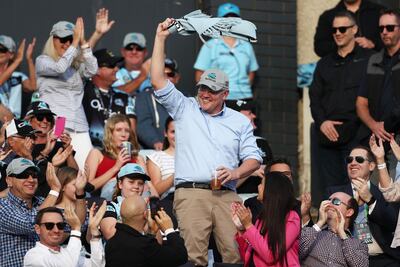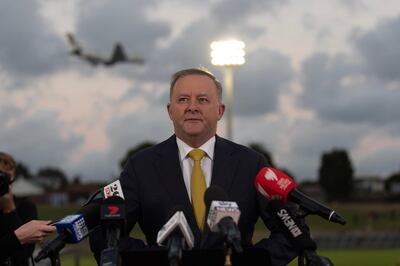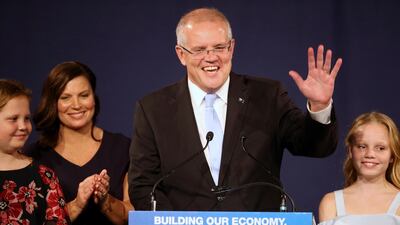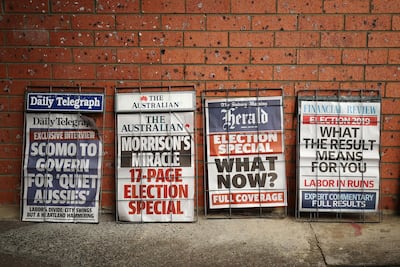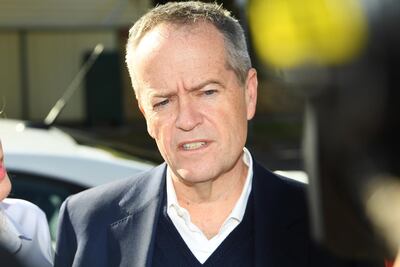The Australian election result has come as a shock. With more than three-quarters of the votes counted, prime minister Scott Morrison has secured a majority government and his Liberal-National coalition has taken 76 out of 151 seats in the lower House of Representatives, confounding pollsters, commentators and election-watchers. The centre-left opposition Labor party had led in the polls for three years and was cruising to a supposed victory. But the only poll that matters – the one held on election day – showed they were all wrong, including Newspoll on the eve of the election, which is traditionally accurate in matching the next day’s result. Even the exit poll commissioned for the Nine Network television broadcaster as ballot stations closed was also wrong.
No one has a clear answer for why the polls, always an inexact science, were so out of kilter with community sentiment but there are plenty of theories abounding. Ipsos, Galaxy, Essential and others have pointed out that they were within the 3 per cent margin of error, but that only goes some way to explaining the surprise result. Essential’s executive director Peter Lewis went so far as to say the polls were “an accurate reflection of where the public was at the start of the week and there was a move to the government in the final days of the campaign”. He also pointed to 8 per cent of voters polled being undecided a week before casting their votes.
The Morrison product, combined with his relentless message that the opposition posed an economic risk, worked, especially in Queensland, Australia's most socially conservative state, heavily reliant on coal-mining and industry
Other theories include the notion that Australia is relentlessly over-polled and voters have begun to lie to pollsters to rig the result. Anecdotally, voters stated on radio call-ins and social media that they had deliberately done so. A theory more widely shared is that the death of the landline phone is making it harder for pollsters to reach huge parts of the population. I, for instance, have only ever had a mobile telephone number registered in my name. When I left home in 2001, aged 17, I left behind the idea of having a landline phone. This generational shift to unlisted mobile phone numbers makes it harder for polling companies to obtain a sample that genuinely represents the country, particularly where younger voters are concerned.
But the polling failure is only subsidiary to the opposition’s disastrous blunder in losing what was widely considered to be an “unlosable” election.
It was not just polling predictions that had given the Labor opposition confidence that it would win office. In August last year, when the Liberal party knocked then prime minister Malcolm Turnbull off his pedestal in a divisive coup and replaced him with Mr Morrison, the expectation was that the electorate would repeat history and punish the government for the unseemly chaos, just as it had done in the 2013 election after the Labor party switched prime ministers twice in its six years in office.
Then, the Coalition leader was Tony Abbott, who, although widely viewed as unpopular, managed to deliver a landslide victory. In 2019, history was expected to repeat itself. Instead, voters upended expectations. And, contrary to predictions, the leadership handover from Mr Turnbull to Mr Morrison in August 2018 was the reason.
Mr Turnbull, an independently wealthy businessman who came to politics late in life, found it difficult to connect with an Australian electorate that has historically rewarded leaders with the common touch. Mr Morrison, a footy-loving, plain-speaking, baseball cap-wearing father of two girls, and evangelical Christian from the suburbs of Sydney to boot, ticked the “knockabout bloke” box.
By contrast, Labor’s Bill Shorten, who quit as party leader two days ago after his humiliating defeat, had never inspired voters, despite having six years to improve his image. With poor communication skills and an air of faux sincerity, he remained viable only because he was able to attack Mr Turnbull as rich and therefore out of touch.
So confident was the Labor party when Mr Turnbull was the prime minister that it bravely did what no opposition has done since 1993 – it put forward a bold agenda of tax changes. The polls still showed Labor in the lead, even as Mr Morrison launched an all-out assault on the policies, claiming they would equate to $387 billion in tax increases.
What the polls failed to show was the government’s attack was beginning to work. Labor had bitten off more than it could ably chew in one go, by trying to close tax loopholes for share owners and property investors. Combined with a deeply unpopular leader, whose performance faltered as the campaign progressed, Labor MPs began privately conceding that their leader was holding them back in a country that is obsessed with property prices and the level of interest rates.
Still, no one imagined the Coalition could drag itself back from the utter chaos of less than a year ago. But Mr Morrison proved an adroit campaigner. Borrowing from the school of US President Donald Trump, he donned a baseball cap, ate meat pies and drank beers for the camera, spoke in plain language and cleverly posed as an outsider, quite apart from the “Canberra bubble” he was so fond of lambasting, comprising Australia’s political elite.
He made no secret of his evangelical faith and proudly and prominently wore an Australian flag badge on his lapel. Australia is a proudly secular society and is not prone to constant displays of patriotism but it resonated with those whom Mr Morrison dubbed on election night as the “quiet Australians”, many of whom hail from Australia’s growing migrant population – often religious, aspirational and fierce proponents of family values.
The Morrison product, combined with his relentless message that the opposition posed an economic risk, worked, especially in Queensland, Australia’s most socially conservative state, heavily reliant on coal-mining and industry. There, Labor’s pledge to raise Australia’s carbon reduction targets to 50 per cent was viewed as a threat to local jobs, and one imposed on them by morally superior southerners, no less.
Mr Morrison’s win has destroyed political norms in Australia and will likely end daring tax changes from either side of the political spectrum for decades. It will cause a crisis of confidence in the centre-left about whether the bulk of Australians are as ready to embrace progressiveness and radical economic change as the noisy inhabitants of social media can suggest – wrongly, as it now turns out. It will justify leadership changes, despite the two major parties' attempts to impose strict rules on MPs to stop the revolving door of Australia’s prime ministership, which has made it an international laughing stock. And the failure of the polls, obsessively reported by Australian news outlets, will only further weaken trust in the media at time when journalists worldwide are trying to restore faith in traditional media and defend themselves against charges of fake news.
Latika Bourke is an Australian journalist with the Sydney Morning Herald and The Age newspapers and worked as a Canberra press gallery correspondent covering the Australian parliament for eight years
RESULTS
%3Cp%3E%0D%3Cstrong%3E1.45pm%3A%3C%2Fstrong%3E%20Green%20Oasis%20Trading%20%E2%80%93%20Maiden%20(PA)%20Dh50%2C000%20(Dirt)%201%2C400m%0D%3Cbr%3E%3Cstrong%3EWinner%3A%3C%2Fstrong%3E%20Meeqat%2C%20Saif%20Al%20Balushi%20(jockey)%2C%20Khalifa%20Al%20Neyadi%20(trainer)%0D%3Cbr%3E%3Cstrong%3E2.15pm%3A%20%3C%2Fstrong%3EAl%20Shafar%20Investment%20%E2%80%93%20Maiden%20(TB)%20Dh60%2C000%20(D)%201%2C400m%0D%3Cbr%3E%3Cstrong%3EWinner%3A%3C%2Fstrong%3E%20Flying%20Hunter%2C%20Ray%20Dawson%2C%20Ahmad%20bin%20Harmash%0D%3Cbr%3E%3Cstrong%3E2.45pm%3A%20%3C%2Fstrong%3EThe%20Union%2051%20Cup%20%E2%80%93%20Handicap%20(TB)%20Dh84%2C000%20(D)%201%2C400m%0D%3Cbr%3E%3Cstrong%3EWinner%3A%3C%2Fstrong%3E%20Ibra%20Attack%2C%20Adrie%20de%20Vries%2C%20Ahmed%20Al%20Shemaili%0D%3Cbr%3E%3Cstrong%3E3.15pm%3A%3C%2Fstrong%3E%20ASCANA%20Thakaful%20%E2%80%93%20Maiden%20(TB)%20Dh60%2C000%20(D)%201%2C200m%0D%3Cbr%3E%3Cstrong%3EWinner%3A%3C%2Fstrong%3E%20Onda%20Ruggente%2C%20Royston%20Ffrench%2C%20Salem%20bin%20Ghadayer%0D%3Cbr%3E%3Cstrong%3E3.45pm%3A%20%3C%2Fstrong%3ECommercial%20Bank%20of%20Dubai%20%E2%80%93%20Handicap%20(TB)%20Dh76%2C000%20(D)%201%2C200m%0D%3Cbr%3EWinner%3A%20Dignity%20Joy%2C%20Antonio%20Fresu%2C%20Musabah%20Al%20Muhairi%0D%3Cbr%3E%3Cstrong%3E4.15pm%3A%20%3C%2Fstrong%3EDubai%20Real%20Estate%20Centre%20%E2%80%93%20Handicap%20(TB)%20Dh76%2C000%20(D)%201%2C600m%0D%3Cbr%3E%3Cstrong%3EWinner%3A%3C%2Fstrong%3E%20Tolmount%2C%20Xavier%20Ziani%2C%20Salem%20bin%20Ghadayer%0D%3Cbr%3E%3Cstrong%3E4.45pm%3A%20%3C%2Fstrong%3EJebel%20Ali%20Racecourse%20%E2%80%93%20Handicap%20(TB)%20Dh84%2C000%20(D)%201%2C950m%0D%3Cbr%3E%3Cstrong%3EWinner%3A%20%3C%2Fstrong%3ERakeez%2C%20Tadhg%20O%E2%80%99Shea%2C%20Bhupat%20Seemar%3C%2Fp%3E%0A
What it means to be a conservationist
Who is Enric Sala?
Enric Sala is an expert on marine conservation and is currently the National Geographic Society's Explorer-in-Residence. His love of the sea started with his childhood in Spain, inspired by the example of the legendary diver Jacques Cousteau. He has been a university professor of Oceanography in the US, as well as working at the Spanish National Council for Scientific Research and is a member of the World Economic Forum’s Global Future Council on Biodiversity and the Bio-Economy. He has dedicated his life to protecting life in the oceans. Enric describes himself as a flexitarian who only eats meat occasionally.
What is biodiversity?
According to the United Nations Environment Programme, all life on earth – including in its forests and oceans – forms a “rich tapestry of interconnecting and interdependent forces”. Biodiversity on earth today is the product of four billion years of evolution and consists of many millions of distinct biological species. The term ‘biodiversity’ is relatively new, popularised since the 1980s and coinciding with an understanding of the growing threats to the natural world including habitat loss, pollution and climate change. The loss of biodiversity itself is dangerous because it contributes to clean, consistent water flows, food security, protection from floods and storms and a stable climate. The natural world can be an ally in combating global climate change but to do so it must be protected. Nations are working to achieve this, including setting targets to be reached by 2020 for the protection of the natural state of 17 per cent of the land and 10 per cent of the oceans. However, these are well short of what is needed, according to experts, with half the land needed to be in a natural state to help avert disaster.
Stan%20Lee
%3Cp%3E%3Cstrong%3EDirector%3A%3C%2Fstrong%3E%20David%20Gelb%3C%2Fp%3E%0A%3Cp%3E%3Cstrong%3ERating%3A%3C%2Fstrong%3E%203%2F5%3C%2Fp%3E%0A
WTL%20SCHEDULE
%3Cp%3EDECEMBER%2019%20(6pm)%0D%3Cbr%3EKites%20v%20Eagles%0D%3Cbr%3EAliassime%20v%20Kyrgios%0D%3Cbr%3ESwiatek%20v%20Garcia%0D%3Cbr%3EEntertainment%3A%20Tiesto%3C%2Fp%3E%0A%3Cp%3EDECEMBER%2020%20(6pm)%0D%3Cbr%3EFalcons%20v%20Hawks%0D%3Cbr%3EDjokovic%20v%20Zverev%0D%3Cbr%3ESabalenka%20v%20Rybakina%0D%3Cbr%3EEntertainment%3A%20Wizkid%0D%3Cbr%3E%0D%3Cbr%3EDECEMBER%2021%20(6pm)%0D%3Cbr%3EFalcons%20v%20Eagles%0D%3Cbr%3EDjokovic%20v%20Kyrgios%0D%3Cbr%3EBadosa%20v%20Garcia%0D%3Cbr%3EEntertainment%3A%20Ne-Yo%0D%3Cbr%3E%0D%3Cbr%3EDECEMBER%2022%20(6pm)%0D%3Cbr%3EHawks%20v%20Kites%0D%3Cbr%3EThiem%20v%20Aliassime%0D%3Cbr%3EKontaveit%20v%20Swiatek%0D%3Cbr%3EEntertainment%3A%20deadmau5%0D%3Cbr%3E%0D%3Cbr%3EDECEMBER%2023%20(2pm)%0D%3Cbr%3EEagles%20v%20Hawks%0D%3Cbr%3EKyrgios%20v%20Zverev%0D%3Cbr%3EGarcia%20v%20Rybakina%0D%3Cbr%3EEntertainment%3A%20Mohammed%20Ramadan%0D%3Cbr%3E%0D%3Cbr%3EDECEMBER%2023%20(6pm)%0D%3Cbr%3EFalcons%20v%20Kites%0D%3Cbr%3EDjokovic%20v%20Aliassime%0D%3Cbr%3ESabalenka%20v%20Swiatek%0D%3Cbr%3EEntertainment%3A%20Mohammed%20Ramadan%0D%3Cbr%3E%0D%3Cbr%3EDECEMBER%2024%20(6pm)%0D%3Cbr%3EFinals%0D%3Cbr%3EEntertainment%3A%20Armin%20Van%20Buuren%0D%3Cbr%3E%0D%3C%2Fp%3E%0A
Dengue%20fever%20symptoms
%3Cul%3E%0A%3Cli%3EHigh%20fever%3C%2Fli%3E%0A%3Cli%3EIntense%20pain%20behind%20your%20eyes%3C%2Fli%3E%0A%3Cli%3ESevere%20headache%3C%2Fli%3E%0A%3Cli%3EMuscle%20and%20joint%20pains%3C%2Fli%3E%0A%3Cli%3ENausea%3C%2Fli%3E%0A%3Cli%3EVomiting%3C%2Fli%3E%0A%3Cli%3ESwollen%20glands%3C%2Fli%3E%0A%3Cli%3ERash%3C%2Fli%3E%0A%3C%2Ful%3E%0A%3Cp%3EIf%20symptoms%20occur%2C%20they%20usually%20last%20for%20two-seven%20days%3C%2Fp%3E%0A
SPEC%20SHEET
%3Cp%3E%3Cstrong%3EProcessor%3A%3C%2Fstrong%3E%20Apple%20M2%2C%208-core%20GPU%2C%2010-core%20CPU%2C%2016-core%20Neural%20Engine%3C%2Fp%3E%0A%3Cp%3E%3Cstrong%3EDisplay%3A%3C%2Fstrong%3E%2013.3-inch%20Retina%2C%202560%20x%201600%2C%20227ppi%2C%20500%20nits%2C%20True%20Tone%2C%20wide%20colour%3C%2Fp%3E%0A%3Cp%3E%3Cstrong%3EMemory%3A%3C%2Fstrong%3E%208%2F16%2F24GB%3C%2Fp%3E%0A%3Cp%3E%3Cstrong%3EStorage%3A%3C%2Fstrong%3E%20256%2F512GB%20%2F%201%2F2TB%3C%2Fp%3E%0A%3Cp%3E%3Cstrong%3EI%2FO%3A%3C%2Fstrong%3E%20Thunderbolt%203%20(2)%2C%203.5mm%20audio%3B%20Touch%20Bar%20with%20Touch%20ID%3C%2Fp%3E%0A%3Cp%3E%3Cstrong%3EConnectivity%3A%3C%2Fstrong%3E%20Wi-Fi%206%2C%20Bluetooth%205.0%3C%2Fp%3E%0A%3Cp%3E%3Cstrong%3EBattery%3A%3C%2Fstrong%3E%2058.2Wh%20lithium-polymer%2C%20up%20to%2020%20hours%3C%2Fp%3E%0A%3Cp%3E%3Cstrong%3ECamera%3A%3C%2Fstrong%3E%20720p%20FaceTime%20HD%3C%2Fp%3E%0A%3Cp%3E%3Cstrong%3EVideo%3A%3C%2Fstrong%3E%20Support%20for%20HDR%20with%20Dolby%20Vision%2C%20HDR10%2C%20ProRes%3C%2Fp%3E%0A%3Cp%3E%3Cstrong%3EAudio%3A%3C%2Fstrong%3E%20Stereo%20speakers%20with%20HDR%2C%20wide%20stereo%2C%20Spatial%20Audio%20support%2C%20Dolby%20support%3C%2Fp%3E%0A%3Cp%3E%3Cstrong%3EIn%20the%20box%3A%3C%2Fstrong%3E%20MacBook%20Pro%2C%2067W%20power%20adapter%2C%20USB-C%20cable%3C%2Fp%3E%0A%3Cp%3E%3Cstrong%3EPrice%3A%3C%2Fstrong%3E%20From%20Dh5%2C499%3C%2Fp%3E%0A
MATCH INFO
What: 2006 World Cup quarter-final
When: July 1
Where: Gelsenkirchen Stadium, Gelsenkirchen, Germany
Result:
England 0 Portugal 0
(Portugal win 3-1 on penalties)
UAE currency: the story behind the money in your pockets
Get inspired
Here are a couple of Valentine’s Day food products that may or may not go the distance (but have got the internet talking anyway).
Sourdough sentiments: Marks & Spencer in the United Kingdom has introduced a slow-baked sourdough loaf dusted with flour to spell out I (heart) you, at £2 (Dh9.5). While it’s not available in the UAE, there’s nothing to stop you taking the idea and creating your own message of love, stencilled on breakfast-inbed toast.
Crisps playing cupid: Crisp company Tyrells has added a spicy addition to its range for Valentine’s Day. The brand describes the new honey and chilli flavour on Twitter as: “A tenderly bracing duo of the tantalising tingle of chilli with sweet and sticky honey. A helping hand to get your heart racing.” Again, not on sale here, but if you’re tempted you could certainly fashion your own flavour mix (spicy Cheetos and caramel popcorn, anyone?).
Read more about the coronavirus
KILLING OF QASSEM SULEIMANI
Dust and sand storms compared
Sand storm
- Particle size: Larger, heavier sand grains
- Visibility: Often dramatic with thick "walls" of sand
- Duration: Short-lived, typically localised
- Travel distance: Limited
- Source: Open desert areas with strong winds
Dust storm
- Particle size: Much finer, lightweight particles
- Visibility: Hazy skies but less intense
- Duration: Can linger for days
- Travel distance: Long-range, up to thousands of kilometres
- Source: Can be carried from distant regions
MATCH INFO
Barcelona 5 (Lenglet 2', Vidal 29', Messi 34', 75', Suarez 77')
Valladolid 1 (Kiko 15')
Key facilities
- Olympic-size swimming pool with a split bulkhead for multi-use configurations, including water polo and 50m/25m training lanes
- Premier League-standard football pitch
- 400m Olympic running track
- NBA-spec basketball court with auditorium
- 600-seat auditorium
- Spaces for historical and cultural exploration
- An elevated football field that doubles as a helipad
- Specialist robotics and science laboratories
- AR and VR-enabled learning centres
- Disruption Lab and Research Centre for developing entrepreneurial skills
Company profile: buybackbazaar.com
Name: buybackbazaar.com
Started: January 2018
Founder(s): Pishu Ganglani and Ricky Husaini
Based: Dubai
Sector: FinTech, micro finance
Initial investment: $1 million
